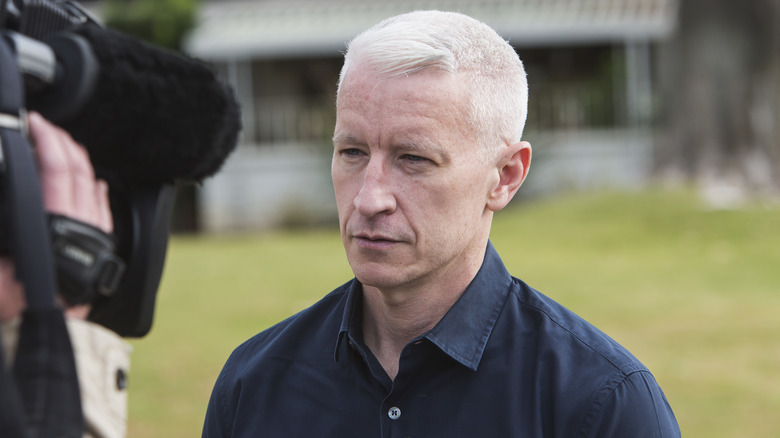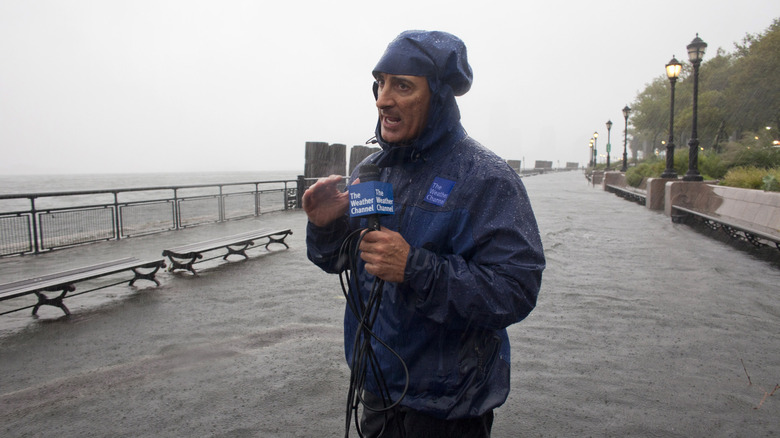Anderson Cooper's On-Site Hurricane Milton Coverage Blows Up In His Face (Literally)
Hurricanes are dangerous for everyone, even the TV personalities who report from the middle of the heavy rain and wind. CNN's Anderson Cooper learned that firsthand during his coverage of Hurricane Milton.
Milton made landfall on Florida's west coast as a Category 3 storm the night of October 9, 2024, bringing with it heavy rain, winds of up to 120 miles per hour, and even tornadoes. It ripped the roof of Tropicana Field, where the Tampa Bay Rays play baseball, to shreds, and left an estimated 3 million people without power, according to USA Today.
The hurricane was quite simply massive when it hit, and even the highest-ranking officials couldn't understate its destructive power. In remarks from the White House just before Milton made landfall, President Joe Biden said that, even though the wind speeds were slowing a bit, "It's still expected to be one of the most and worst destructive hurricanes to hit Florida in over a century."
Anderson Cooper on being hit with debris: 'That wasn't good'
Even with all the danger Hurricane Milton posed, and mandatory orders to evacuate, people still remained on the Florida coast of the Gulf of Mexico to brave the storm surge. That included TV reporters who did what they do when a massive hurricane hits: report from the middle of the tempest and risk getting blown away on live TV.
Among those was CNN's Anderson Cooper, who described the force of the storm while standing on a boardwalk in Bradenton, Florida, just north of Sarasota, where the storm's center made landfall. As he reported on the conditions by the Manatee River, a piece of debris flew up and smashed him in the face. He said as it hit, "The water now is really starting to pour over. If you look at the ground — whoa! Okay. That wasn't good."
Ever the professional, Cooper kept on reporting for over a minute more as he continued to be pelted with rain, but thankfully no other stray pieces of debris. He seemed uninjured. Even so, some viewers didn't think it was very responsible for anyone, including the anchor of "Anderson Cooper 360," to be out in that.
Commenters thought it was irresponsible to report from the storm
When an account on X, formerly known as Twitter, posted footage of Anderson Cooper taking the piece of debris to the face while reporting from the field on Hurricane Milton, quite a few commenters said it just wasn't a good idea for him to be out there in the middle of a historic storm. One wrote, "Literally, nobody is asking for Anderson Cooper to stand outside in the rain and wind and report on a hurricane we all know about. We have YouTube, man, we know what it looks like." The original poster replied by pointing out that someone has to shoot those YouTube videos, after all.
Another X user commented, "I don't understand why they send reporters out in this when they tell everyone else to evacuate." Another, communications expert Brad Ross, posted, "Unnecessary. Reporters getting blown around in storms has become cliche. It's dangerous we get it." Also, isn't Cooper far too wealthy to be putting his life on the line for his job? He could retire in comfort even without a large inheritance from his late mother, Gloria Vanderbilt.
Why do reporters go into hurricanes, anyway?
It's true that there is a longstanding tradition of TV reporters standing in the midst of raging hurricanes to report from the scene. Arguably, Dan Rather made his name as a national figure with his reporting on Hurricane Carla hitting Texas in 1961.
In 2023, the Poynter Institute took on the question of why reporters feel the need to send dispatches directly from within major storms. Longtime journalist Al Tompkins explained, referring to a Weather Channel veteran of live storm coverage: "Let me tell you that live coverage saves lives. The communities that are suffering most desperately need journalists to document their needs. Help follows coverage. And I can say for sure that when Jim Cantore is on the air documenting the devastation in your town, emergency crews and federal aid will get there faster than if you suffer and nobody notices."
So, is potentially getting smacked in the face with debris worth the trade-off? They report, you decide.



